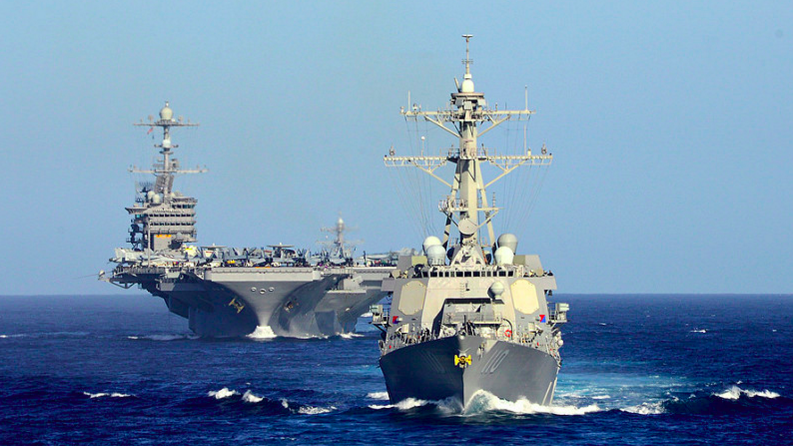Ash Carter Visits Carrier in S. China Sea

The chief U.S. defense official visited an American aircraft carrier transiting the disputed South China Sea on Friday, as China said one of its top military officers had visited islands and reefs in the region to oversee building work.
U.S. Defense Secretary Ash Carter flew to the nuclear-powered USS John C. Stennis for a two-hour visit as it sailed 60 to 70 miles west of the Philippines island of Luzon.
While there, he dismissed China's characterization of a more robust U.S. military presence in the region as being the cause of heightened tensions.
"What's new is not an American carrier in this region," Carter said aboard the Stennis, where he met U.S. troops and observed flight operations. "What's new is the context of tension which exists which we want to reduce."
China claims almost the entire South China Sea, believed to have huge deposits of oil and gas. Brunei, Malaysia, the Philippines, Taiwan and Vietnam also have claims to parts of the waters, through which about $5 trillion in trade is shipped every year.
The carrier visit, while not unprecedented, was still likely to inflame tension with China, which says the United States is "militarizing" the South China Sea and endangering security.
Carter made a similar stop aboard the USS Theodore Roosevelt in November as it transited the South China Sea near Malaysia.
On Friday's visit, Carter was accompanied by Philippine Defense Secretary Voltaire Gazmin.
The United States has already conducted what it calls "freedom of navigation" patrols in the area, sailing within 12-nautical mile territorial limits around disputed islands controlled by China to underscore its right to navigate the seas.
In a brief statement, China's defense ministry said Fan Changlong, one of the vice chairmen of the Central Military Commission which controls its military, had recently visited some of China's islands and reefs there.
While not saying where or when he went, it did say he met soldiers and inspected building work. He also visited islands in the contested Spratly archipelago, the ministry said.
China had earlier denounced plans announced in Manila on Thursday to deepen U.S.-Philippine military ties, including joint patrols in the South China Sea, saying they reflected a "Cold War mentality".
CHINA SAYS U.S. PROMOTING MILITARIZATION
Chinese Foreign Ministry spokesman Lu Kang said the U.S. move was proof of "who was the real promoter of the militarization of the South China Sea."
The United States had never been able to give an example of civilian freedom of navigation being affected in the South China Sea, he told a daily news briefing.
"In reality, what the U.S. is probably talking about is military freedom of navigation and safety. If that's the case, then many countries, not only in this region, will hope that these big countries can act in accordance with international law."
The Stennis has been on a routine deployment in the Western Pacific for three months, said the carrier strike group's commander, Rear Admiral Ronald Boxall. Their ships interact with Chinese ships on a near-constant basis, he said, though he characterized the Chinese operations as professional.
"We see quite a presence out here," Boxall said. "It's more than I've seen in the past but that's reasonable considering they have grown as a navy."
During the course of a six-day trip to Asia, Carter has maintained that U.S. strategy was aimed at maintaining peace and lawful settlement of disputes, not provoking a conflict with a major world power.
"We have been here for decade upon decade," Carter said. "The only reason that question even comes up is because of what has gone on over the last year and that's a question of Chinese behavior."
The carrier stop caps a trip designed to highlight the expanding partnerships the United States is building with countries in the region, which Carter said had been asking for a greater U.S. role in response to anxiety over Chinese actions.
In addition to the joint U.S.-Philippines patrols announced on Thursday, hundreds of U.S. troops and some aircraft will stay behind in the Philippines on a temporary rotation.
In India this week, Carter won a preliminary but long-awaited agreement to share military logistics, considered a necessary step to deeper security cooperation between the two countries.
